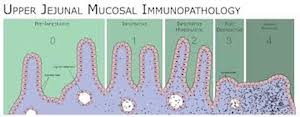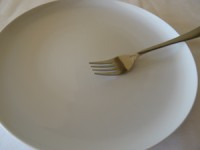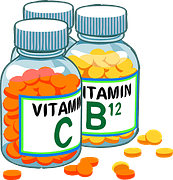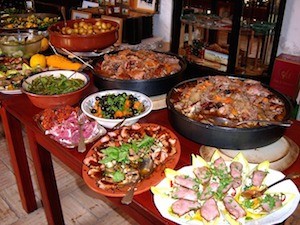My mother, just like many people who have lived through a war, suffered from hunger in her childhood. For almost a year all she ate were Jerusalem artichokes. However, she was never sick at the time, her growth was completely normal and even until her eighties she had good teeth that many children and adults could envy. On the other hand, today most children suffer tooth decay and dental malformations, recurrent gastro-intestinal and respiratory diseases, allergies, scoliosis, fatigue, anemia, problems at school as well as with their behavior, etc. These children usually have a lack of calcium, iron, magnesium, vitamin D, B vitamins, etc. How can this paradox be explained?
Soil depletion
 While nowadays in our world children do not lack food, the amount of minerals and vitamins of current products is lower than it used to be, especially in fruits and vegetables, mainly due to intensive farming which depletes soil reserves.
While nowadays in our world children do not lack food, the amount of minerals and vitamins of current products is lower than it used to be, especially in fruits and vegetables, mainly due to intensive farming which depletes soil reserves.
However, we can find many people of excellent health eating the same kind of products. Of course, it is preferable to consume organic products, as their nutrient content and quality is far superior. But this does not seem to be the main reason for the deficiencies.
 The aspect that has drastically changed regarding our ancestors is the type of food: fast-food, industrial and pre-cooked food, additives, increase in the consumption of sugar and carbohydrates such as pizza and pasta. Most children are addicted to foods that are rich in carbohydrates, dairy products and sugars, and their vegetable, fruit and fish intake is very low or almost zero. So their diet usually has a high caloric value and very low nutrient density in terms of vitamins, minerals and proteins.
The aspect that has drastically changed regarding our ancestors is the type of food: fast-food, industrial and pre-cooked food, additives, increase in the consumption of sugar and carbohydrates such as pizza and pasta. Most children are addicted to foods that are rich in carbohydrates, dairy products and sugars, and their vegetable, fruit and fish intake is very low or almost zero. So their diet usually has a high caloric value and very low nutrient density in terms of vitamins, minerals and proteins.
 Furthermore, we eat an excessive amount of food. Everyday there is an excuse to eat some extraordinary and unhealthy thing: parties, celebrations, meetings, outings, excursions, restaurants, visiting friends, etc. Eating and drinking frequently to excess are always linked to the decline of a society or culture and this is something we seriously must think about these days.
Furthermore, we eat an excessive amount of food. Everyday there is an excuse to eat some extraordinary and unhealthy thing: parties, celebrations, meetings, outings, excursions, restaurants, visiting friends, etc. Eating and drinking frequently to excess are always linked to the decline of a society or culture and this is something we seriously must think about these days.
All these factors have an impact on intestinal health by favoring the development of undesirable and/or pathogenic bacteria in the gut, which are a major cause of the lack of nutrients. Junk food is not recognized as food by enzymes and overeating exhausts the enzyme system, so in both cases the food is not well digested, and as a consequence it feeds undesirable bacteria in the gut.
The main reason for the current deficiency is poor absorption of nutrients in the intestine.
1.- The first circumstance that explains an incorrect absorption is when due to different causes, intestinal villi are damaged. Intestinal villi increase the surface of the bowel as well as its ability to absorb nutrients. One condition that damages such villi is celiac disease, or when there is an intestinal dysbiosis due to the lack of lactobacilli protecting intestinal enterocytes of the intestinal villi. (2)

2.- Another major cause of nutrient deficiency is intestinal dysbiosis, which involves abnormal development of certain undesirable or pathological bacteria. Some of these bacteria have a preference for certain nutrients, such as sulfate-reducing bacteria feed on sulfur, which is one of the most important minerals for the body to properly perform detoxification. Others, such as Actinomyces, Mycobacterium, some strains of E-coli, etc feed on iron. (2)
 3.- Numerous studies relate intolerance to dairy products and gluten to demineralization, osteoporosis and anemia. This is explained by the damage caused in the intestine due to the inflammatory reaction of the immune system against such foods. (1)
3.- Numerous studies relate intolerance to dairy products and gluten to demineralization, osteoporosis and anemia. This is explained by the damage caused in the intestine due to the inflammatory reaction of the immune system against such foods. (1)
 4.- Lack of magnesium is due to the consumption of sugar because the body needs to use a large amount of this mineral to metabolize sugar (56 molecules of magnesium for each one of sugar). (2)
4.- Lack of magnesium is due to the consumption of sugar because the body needs to use a large amount of this mineral to metabolize sugar (56 molecules of magnesium for each one of sugar). (2)
5.- Anti-nutrients such as phytates, oxalates and lectins, which exist in many foods, such as whole grains, legumes and nuts, also inhibit the absorption of minerals. (5)
6.- Bifidobacteria which should live in a healthy intestine, perform the synthesis of amino acids, protein, vitamin K, B vitamins and help the absorption of calcium, iron and vitamin D. If these bacteria are not present in sufficient quantity, then this work can not be performed. (2)
7.- Sun exposure, exercise, rest and sleep, clean water and air, etc., are also other important factors that are needed in order to have a good absorption and synthesis of several minerals and vitamins.
Fasting is recommended in various religions: Catholic, Muslim, Jewish, Orthodox, etc. Although the purpose of this kind of fast is meditation and the deepening of faith, fasting is based on the most ancient traditional health practices, already practiced in indigenous Aztec civilizations as well as in the early civilizations of Mesopotamia and Egypt.
People used to fast when the "pantries" were emptied at the end of winter and the earth had not yet yielded its first fruits of spring, a period that coincides with the Catholic Lent.
Fasting has always been used in the triple way of body cleansing, mental decontamination and search for spiritual clarity. In Islam, Muhammad’s precept is "Fasting means health." (4)
 While fasting, all the organs of our bodies reduce their activity. Only the organs of elimination and excretion work more actively. Fasting allows the body to get rid of the accumulation of toxic waste. (3) Fasting does not cause deficits, it rather detoxifies the body so that nutrients can be absorbed better.
While fasting, all the organs of our bodies reduce their activity. Only the organs of elimination and excretion work more actively. Fasting allows the body to get rid of the accumulation of toxic waste. (3) Fasting does not cause deficits, it rather detoxifies the body so that nutrients can be absorbed better.
Scientists at the National Institute on Aging in Baltimore (9) claimed to have found evidence showing that periods of almost total fasting for one or two days a week could protect the brain against certain degenerative diseases such Alzheimer's and Parkinson's.
It is well-known that a hypocaloric diet increases longevity. Rats that are restricted from food increase their longevity by up to 40%. A similar effect has been observed on humans. But in this institute they went even further. They claim that experiencing hunger could prevent not only a poor state of health and an early death but also delay the onset of certain diseases of the brain, including cerebral vascular accidents.
According to this institute the ideal way of fasting would be intermittent calorie restriction, that is, semi-fasting or fasting two days a week, followed by five days of eating normally.
So we should not be afraid of skipping meals during the day, it is not always necessary to have breakfast or dinner if we are not really hungry. For adults it is beneficial to do 24-48 hour fasts once a week, or at least once a month, and longer fasts of up to 3 days maximum without medical supervision once a year.
There are many different types of fasting: water fasting, juice fasting, fruit fasting or semi-fasting, etc.
It is not advisable to fast if someone has never detoxed previously for a certain amount of time, and does not have a diet that takes into account intolerances and avoids junk food. Fasting when someone’s daily diet is completely wrong will definitely not bring the desired effect, moreover, it may cause a too strong „clash” to the body. It is also useless if somebody starts gorging on food and continues eating unhealthily after a fast, because the body will become intoxicated again in a few days’ time.
You may go to a center where you can be guided and you may have a medical follow-up of the fasting period. A nutritional therapist will tell you about the various options and help you plan the fast properly.
When a child refuses to eat we should not be alarmed. The human body is very intelligent, and will not starve itself.
The important thing in these situations is to look for the cause of poor appetite:
1.- Does the child have any kind of disease? Does the body need rest to recover from it?
Does the child have any kind of disease? Does the body need rest to recover from it?
When we are sick, especially if there is a gastro-intestinal disease, the body needs to do a detox, concentrate its energies on the immune system and not on digestions or any type of physical activities
2.- Is this lack of hunger selective, ie, does the child lack hunger to eat healthy foods like fruits and vegetables but not for other foods, such as pasta, bread, pizza, candy, hamburgers, etc.?
If so, it means that the child has an addiction to carbohydrates, dairy products, sugar, meat, etc. These products stimulate the production of endorphin, a substance of pleasure when ingested, so that the body looks for this gratification. In contrast, the vegetables and fruits do not produce endorphins, conversely, their antioxidant and detoxifying effects may cause quite pronounced discomfort in people with a major toxic load.
3.- Does the child always eat very little of all kinds of food? Is his or her weight low?
The reason for this may be that his/her gut is inflamed, so most of the food produces discomfort, and as a consequence the child avoids food. Furthermore, this inflammation causes intestinal damage that prevents proper absorption of food, producing significant deficiencies, and thus a very low weight.
4.- Does the child never want to have breakfast or dinner?
It is in the morning when the body performs the most important detoxification, so it is normal that a person is not hungry in the morning until he/she has defecated and is in a position to start to accept food again. So we must never impose breakfast!
As for lunch or dinner, sometimes a person eats too much between meals (snacks), or the previous meal has been too heavy and has not yet finished its digestion, or there may be other reasons. In general, it is good to respect the body and not to eat when one is not hungry. What matters is that at the end of the day we have eaten nutritious food and we have not eaten unhealthy food, it is not that important what time we ate them.
The way you will need to act is different, depending on everyone’s personal situation. It is necessary to analyze each case carefully in order to find the solution. A nutritional therapist can guide you on your way.
We should not become worried and give him/her whatever kind of food, even if it is harmful, just for the sake of not leaving him/her hungry. It is always better not to eat foods that affect the body as toxins if there is an intolerance and especially if we are talking about junk food.
 I do not recommend taking vitamins or minerals as food supplements for numerous reasons. On this link you will find a detailed explanation of how they create a dependency, of how there is insufficient research on dosage and side effects, as well as of the potential imbalance that the fact of supplementing onlysome vitamins or minerals – which are substances synthesized in laboratories (even if they are made of natural products) – may involve, etc.
I do not recommend taking vitamins or minerals as food supplements for numerous reasons. On this link you will find a detailed explanation of how they create a dependency, of how there is insufficient research on dosage and side effects, as well as of the potential imbalance that the fact of supplementing onlysome vitamins or minerals – which are substances synthesized in laboratories (even if they are made of natural products) – may involve, etc.
Deficiencies can be supplemented by restoring the function of the body, especially repairing the intestine.
Only in a few specific cases where the situation is very serious and it is not possible to restore the body naturally, may supplements be considered.
When we become ill, for example we catch the flu, usually the first thing we think of is that it is a contagion, infection or cooling. Some people think of other causes, such as the fact that the body is weak due to the lack of some nutrient. But virtually nobody thinks of a food that has possibly weakened him/her: a celebration? too much sugar? some intolerant food hidden in a meal when eating out? a recent vaccination? air or water pollution? negative emotions? ...
Other examples are cramps. When cramps are experienced for a period of time, we normally tend to think that there is a lack of magnesium, calcium and potassium, so we often try to solve the problem by increasing the intake of these minerals, either in their pure state as supplements, or through foods that are rich in these minerals. However, we usually do not realize that a lack of these minerals may be due to the intake of any other food that reduces the reserves of these minerals in the body, such as foods that contain sugar, but also syrups, honey or dry-fruit that contains a high concentration of sugar.
.jpg) During the season of Christmas festivities , ie. the months of December and January it is the time when most diseases show a peak (8) and greater sickness absence is experienced (6). Might it happen because virus work more in holiday season? Or because it is colder? Because there are not enough nutrients, ie. food? Or rather, because there is an excess of food and beverages? And also because there are more family arguments?
During the season of Christmas festivities , ie. the months of December and January it is the time when most diseases show a peak (8) and greater sickness absence is experienced (6). Might it happen because virus work more in holiday season? Or because it is colder? Because there are not enough nutrients, ie. food? Or rather, because there is an excess of food and beverages? And also because there are more family arguments?
Curiously, WHO,which collects statistics of all kinds of diseases, does not carry out studies of this kind.(7)
We have to change the mindset and reflect on what substance could have intoxicated the body instead of focusing on which nutrient is lacking or what microbe could have invaded the body.
Bibliography:
(1) “Ecosystème intestinal & santé optimale”, Dr. Georges Mouton
(2) “Gut and Psychology Syndrome”, Dr. Natasha Campbell-McBride
(3) “Le jeüne. Meilleur Remède de la Nature”, Albert Mosséri
(4) “Historia del ayuno”
(5) ¿Cereales integrales, ¿son tan sanos como dicen?"
(6) “NHS Sickness Absence Rates“
(7) “Estadísticas sanitarias mundiales 2012”, OMS
(8) “Increased winter mortality from acute myocardial infarction and stroke: the effect of age”
(9) “Jeûner pour protéger son cerveau ?”
Soil depletion
 While nowadays in our world children do not lack food, the amount of minerals and vitamins of current products is lower than it used to be, especially in fruits and vegetables, mainly due to intensive farming which depletes soil reserves.
While nowadays in our world children do not lack food, the amount of minerals and vitamins of current products is lower than it used to be, especially in fruits and vegetables, mainly due to intensive farming which depletes soil reserves.However, we can find many people of excellent health eating the same kind of products. Of course, it is preferable to consume organic products, as their nutrient content and quality is far superior. But this does not seem to be the main reason for the deficiencies.
Excess, products that lack nutrients and junk food
 The aspect that has drastically changed regarding our ancestors is the type of food: fast-food, industrial and pre-cooked food, additives, increase in the consumption of sugar and carbohydrates such as pizza and pasta. Most children are addicted to foods that are rich in carbohydrates, dairy products and sugars, and their vegetable, fruit and fish intake is very low or almost zero. So their diet usually has a high caloric value and very low nutrient density in terms of vitamins, minerals and proteins.
The aspect that has drastically changed regarding our ancestors is the type of food: fast-food, industrial and pre-cooked food, additives, increase in the consumption of sugar and carbohydrates such as pizza and pasta. Most children are addicted to foods that are rich in carbohydrates, dairy products and sugars, and their vegetable, fruit and fish intake is very low or almost zero. So their diet usually has a high caloric value and very low nutrient density in terms of vitamins, minerals and proteins. Furthermore, we eat an excessive amount of food. Everyday there is an excuse to eat some extraordinary and unhealthy thing: parties, celebrations, meetings, outings, excursions, restaurants, visiting friends, etc. Eating and drinking frequently to excess are always linked to the decline of a society or culture and this is something we seriously must think about these days.
Furthermore, we eat an excessive amount of food. Everyday there is an excuse to eat some extraordinary and unhealthy thing: parties, celebrations, meetings, outings, excursions, restaurants, visiting friends, etc. Eating and drinking frequently to excess are always linked to the decline of a society or culture and this is something we seriously must think about these days.All these factors have an impact on intestinal health by favoring the development of undesirable and/or pathogenic bacteria in the gut, which are a major cause of the lack of nutrients. Junk food is not recognized as food by enzymes and overeating exhausts the enzyme system, so in both cases the food is not well digested, and as a consequence it feeds undesirable bacteria in the gut.
Malabsorption and intestinal dysbiosis
The main reason for the current deficiency is poor absorption of nutrients in the intestine.
1.- The first circumstance that explains an incorrect absorption is when due to different causes, intestinal villi are damaged. Intestinal villi increase the surface of the bowel as well as its ability to absorb nutrients. One condition that damages such villi is celiac disease, or when there is an intestinal dysbiosis due to the lack of lactobacilli protecting intestinal enterocytes of the intestinal villi. (2)

2.- Another major cause of nutrient deficiency is intestinal dysbiosis, which involves abnormal development of certain undesirable or pathological bacteria. Some of these bacteria have a preference for certain nutrients, such as sulfate-reducing bacteria feed on sulfur, which is one of the most important minerals for the body to properly perform detoxification. Others, such as Actinomyces, Mycobacterium, some strains of E-coli, etc feed on iron. (2)
 3.- Numerous studies relate intolerance to dairy products and gluten to demineralization, osteoporosis and anemia. This is explained by the damage caused in the intestine due to the inflammatory reaction of the immune system against such foods. (1)
3.- Numerous studies relate intolerance to dairy products and gluten to demineralization, osteoporosis and anemia. This is explained by the damage caused in the intestine due to the inflammatory reaction of the immune system against such foods. (1) 4.- Lack of magnesium is due to the consumption of sugar because the body needs to use a large amount of this mineral to metabolize sugar (56 molecules of magnesium for each one of sugar). (2)
4.- Lack of magnesium is due to the consumption of sugar because the body needs to use a large amount of this mineral to metabolize sugar (56 molecules of magnesium for each one of sugar). (2)5.- Anti-nutrients such as phytates, oxalates and lectins, which exist in many foods, such as whole grains, legumes and nuts, also inhibit the absorption of minerals. (5)
6.- Bifidobacteria which should live in a healthy intestine, perform the synthesis of amino acids, protein, vitamin K, B vitamins and help the absorption of calcium, iron and vitamin D. If these bacteria are not present in sufficient quantity, then this work can not be performed. (2)
7.- Sun exposure, exercise, rest and sleep, clean water and air, etc., are also other important factors that are needed in order to have a good absorption and synthesis of several minerals and vitamins.
Fasting
Fasting is recommended in various religions: Catholic, Muslim, Jewish, Orthodox, etc. Although the purpose of this kind of fast is meditation and the deepening of faith, fasting is based on the most ancient traditional health practices, already practiced in indigenous Aztec civilizations as well as in the early civilizations of Mesopotamia and Egypt.People used to fast when the "pantries" were emptied at the end of winter and the earth had not yet yielded its first fruits of spring, a period that coincides with the Catholic Lent.
Fasting has always been used in the triple way of body cleansing, mental decontamination and search for spiritual clarity. In Islam, Muhammad’s precept is "Fasting means health." (4)
 While fasting, all the organs of our bodies reduce their activity. Only the organs of elimination and excretion work more actively. Fasting allows the body to get rid of the accumulation of toxic waste. (3) Fasting does not cause deficits, it rather detoxifies the body so that nutrients can be absorbed better.
While fasting, all the organs of our bodies reduce their activity. Only the organs of elimination and excretion work more actively. Fasting allows the body to get rid of the accumulation of toxic waste. (3) Fasting does not cause deficits, it rather detoxifies the body so that nutrients can be absorbed better.Scientists at the National Institute on Aging in Baltimore (9) claimed to have found evidence showing that periods of almost total fasting for one or two days a week could protect the brain against certain degenerative diseases such Alzheimer's and Parkinson's.
It is well-known that a hypocaloric diet increases longevity. Rats that are restricted from food increase their longevity by up to 40%. A similar effect has been observed on humans. But in this institute they went even further. They claim that experiencing hunger could prevent not only a poor state of health and an early death but also delay the onset of certain diseases of the brain, including cerebral vascular accidents.
According to this institute the ideal way of fasting would be intermittent calorie restriction, that is, semi-fasting or fasting two days a week, followed by five days of eating normally.
So we should not be afraid of skipping meals during the day, it is not always necessary to have breakfast or dinner if we are not really hungry. For adults it is beneficial to do 24-48 hour fasts once a week, or at least once a month, and longer fasts of up to 3 days maximum without medical supervision once a year.
There are many different types of fasting: water fasting, juice fasting, fruit fasting or semi-fasting, etc.
It is not advisable to fast if someone has never detoxed previously for a certain amount of time, and does not have a diet that takes into account intolerances and avoids junk food. Fasting when someone’s daily diet is completely wrong will definitely not bring the desired effect, moreover, it may cause a too strong „clash” to the body. It is also useless if somebody starts gorging on food and continues eating unhealthily after a fast, because the body will become intoxicated again in a few days’ time.
You may go to a center where you can be guided and you may have a medical follow-up of the fasting period. A nutritional therapist will tell you about the various options and help you plan the fast properly.
Picky eaters
The important thing in these situations is to look for the cause of poor appetite:
1.-
 Does the child have any kind of disease? Does the body need rest to recover from it?
Does the child have any kind of disease? Does the body need rest to recover from it?When we are sick, especially if there is a gastro-intestinal disease, the body needs to do a detox, concentrate its energies on the immune system and not on digestions or any type of physical activities
2.- Is this lack of hunger selective, ie, does the child lack hunger to eat healthy foods like fruits and vegetables but not for other foods, such as pasta, bread, pizza, candy, hamburgers, etc.?
If so, it means that the child has an addiction to carbohydrates, dairy products, sugar, meat, etc. These products stimulate the production of endorphin, a substance of pleasure when ingested, so that the body looks for this gratification. In contrast, the vegetables and fruits do not produce endorphins, conversely, their antioxidant and detoxifying effects may cause quite pronounced discomfort in people with a major toxic load.

3.- Does the child always eat very little of all kinds of food? Is his or her weight low?
The reason for this may be that his/her gut is inflamed, so most of the food produces discomfort, and as a consequence the child avoids food. Furthermore, this inflammation causes intestinal damage that prevents proper absorption of food, producing significant deficiencies, and thus a very low weight.
4.- Does the child never want to have breakfast or dinner?
It is in the morning when the body performs the most important detoxification, so it is normal that a person is not hungry in the morning until he/she has defecated and is in a position to start to accept food again. So we must never impose breakfast!
As for lunch or dinner, sometimes a person eats too much between meals (snacks), or the previous meal has been too heavy and has not yet finished its digestion, or there may be other reasons. In general, it is good to respect the body and not to eat when one is not hungry. What matters is that at the end of the day we have eaten nutritious food and we have not eaten unhealthy food, it is not that important what time we ate them.
The way you will need to act is different, depending on everyone’s personal situation. It is necessary to analyze each case carefully in order to find the solution. A nutritional therapist can guide you on your way.
We should not become worried and give him/her whatever kind of food, even if it is harmful, just for the sake of not leaving him/her hungry. It is always better not to eat foods that affect the body as toxins if there is an intolerance and especially if we are talking about junk food.
Dietary supplements
 I do not recommend taking vitamins or minerals as food supplements for numerous reasons. On this link you will find a detailed explanation of how they create a dependency, of how there is insufficient research on dosage and side effects, as well as of the potential imbalance that the fact of supplementing onlysome vitamins or minerals – which are substances synthesized in laboratories (even if they are made of natural products) – may involve, etc.
I do not recommend taking vitamins or minerals as food supplements for numerous reasons. On this link you will find a detailed explanation of how they create a dependency, of how there is insufficient research on dosage and side effects, as well as of the potential imbalance that the fact of supplementing onlysome vitamins or minerals – which are substances synthesized in laboratories (even if they are made of natural products) – may involve, etc.Deficiencies can be supplemented by restoring the function of the body, especially repairing the intestine.
Only in a few specific cases where the situation is very serious and it is not possible to restore the body naturally, may supplements be considered.
Change Your Mindset
When we become ill, for example we catch the flu, usually the first thing we think of is that it is a contagion, infection or cooling. Some people think of other causes, such as the fact that the body is weak due to the lack of some nutrient. But virtually nobody thinks of a food that has possibly weakened him/her: a celebration? too much sugar? some intolerant food hidden in a meal when eating out? a recent vaccination? air or water pollution? negative emotions? ...
Other examples are cramps. When cramps are experienced for a period of time, we normally tend to think that there is a lack of magnesium, calcium and potassium, so we often try to solve the problem by increasing the intake of these minerals, either in their pure state as supplements, or through foods that are rich in these minerals. However, we usually do not realize that a lack of these minerals may be due to the intake of any other food that reduces the reserves of these minerals in the body, such as foods that contain sugar, but also syrups, honey or dry-fruit that contains a high concentration of sugar.
.jpg) During the season of Christmas festivities , ie. the months of December and January it is the time when most diseases show a peak (8) and greater sickness absence is experienced (6). Might it happen because virus work more in holiday season? Or because it is colder? Because there are not enough nutrients, ie. food? Or rather, because there is an excess of food and beverages? And also because there are more family arguments?
During the season of Christmas festivities , ie. the months of December and January it is the time when most diseases show a peak (8) and greater sickness absence is experienced (6). Might it happen because virus work more in holiday season? Or because it is colder? Because there are not enough nutrients, ie. food? Or rather, because there is an excess of food and beverages? And also because there are more family arguments?Curiously, WHO,which collects statistics of all kinds of diseases, does not carry out studies of this kind.(7)
We have to change the mindset and reflect on what substance could have intoxicated the body instead of focusing on which nutrient is lacking or what microbe could have invaded the body.
Bibliography:
(1) “Ecosystème intestinal & santé optimale”, Dr. Georges Mouton
(2) “Gut and Psychology Syndrome”, Dr. Natasha Campbell-McBride
(3) “Le jeüne. Meilleur Remède de la Nature”, Albert Mosséri
(4) “Historia del ayuno”
(5) ¿Cereales integrales, ¿son tan sanos como dicen?"
(6) “NHS Sickness Absence Rates“
(7) “Estadísticas sanitarias mundiales 2012”, OMS
(8) “Increased winter mortality from acute myocardial infarction and stroke: the effect of age”
(9) “Jeûner pour protéger son cerveau ?”
 In our modern and developed Western society, most people have plenty of food. Even the poor can go to community centers where they do not lack food. How do we explain then that there are so many nutrient deficiencies?
In our modern and developed Western society, most people have plenty of food. Even the poor can go to community centers where they do not lack food. How do we explain then that there are so many nutrient deficiencies?











